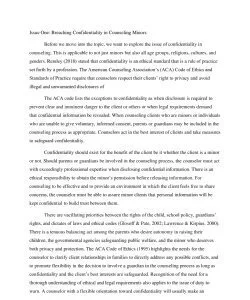Issue One: Breaching Confidentiality in Counseling Minors
Issue One: Breaching Confidentiality in Counseling Minors
Issue One: Breaching Confidentiality in Counseling Minors
Before we move into the topic, we want to explore the issue of confidentiality in counseling. This is applicable to not just minors but also all age groups, religions, cultures, and genders. Remley (2018) stated that confidentiality is an ethical standard that is a rule of practice set forth by a profession. The American Counseling Association’s (ACA) Code of Ethics and Standards of Practice require that counselors respect their clients’ right to privacy and avoid illegal and unwarranted disclosures of
The ACA code lists the exceptions to confidentiality as when disclosure is required to prevent clear and imminent danger to the client or others or when legal requirements demand that confidential information be revealed. When counseling clients who are minors or individuals who are unable to give voluntary, informed consent, parents or guardians may be included in the counseling process as appropriate. Counselors act in the best interest of clients and take measures to safeguard confidentiality.
Confidentiality should exist for the benefit of the client be it whether the client is a minor or not. Should parents or guardians be involved in the counseling process, the counselor must act with exceedingly professional expertise when disclosing confidential information. There is an ethical responsibility to obtain the minor’s permission before releasing information. For counseling to be effective and to provide an environment in which the client feels free to share concerns, the counselor must be able to assure minor clients that personal information will be kept confidential to build trust between them.
There are vacillating priorities between the rights of the child, school policy, guardians’ rights, and dictates of laws and ethical codes (Glosoff & Pate, 20
